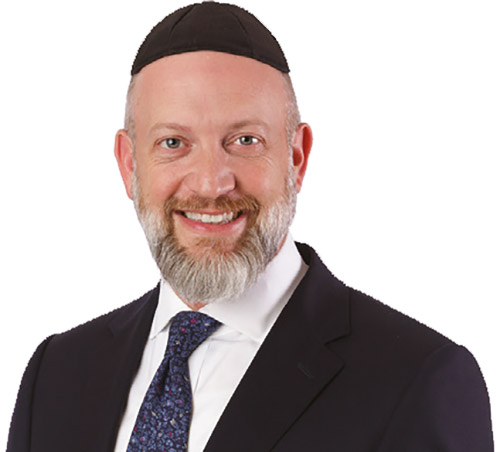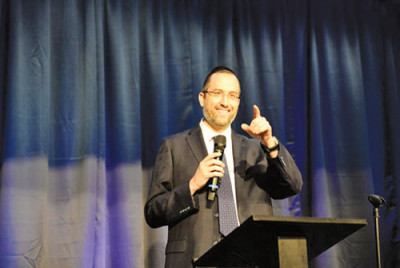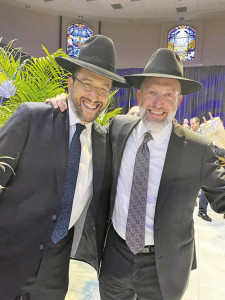
People across the country speak about the Boca Raton community in glowing terms. Florida is known for its less-cumbersome taxes, its politics, beautiful weather, and even its humidity. What is it about Boca that makes it stand out in the landscape of the Sunshine State?
I had the opportunity to sit down with two pillars of the community to hear their perspectives on why Boca Raton is on the national map as one of the centers of Jewish life in North America. What is fascinating about the encounter is that this pair could be perceived as competitors or rivals, but they are actually the best of friends, even though they head up two powerhouse institutions.
Rabbi Efrem Goldberg, originally from Teaneck, moved to Boca Raton in 1999 to be a member of the Boca Raton Community Kollel, under the leadership of Rabbi Kenneth Brander. He was recruited south to do outreach, learning and teaching. After two-and-a-half years, he was appointed assistant rabbi of the Boca Raton Synagogue. Upon the departure of Rabbi Brander in 2005, the congregation wisely appointed Goldberg as its rabbi. Seventeen years ago, he assumed the helm of what was already becoming a flagship shul in Florida.

Rabbi Goldberg is a proud product of Teaneck, having been educated at Yavneh, Frisch, Keren B’Yavneh and Yeshiva University, which he feels prepared him for his leadership role in the Modern Orthodox community. Boca, he feels, has a lot of elements of Teaneck—community, loyalty, commitment.
Rabbi Yaakov Gibber grew up in Pittsburgh and attended Allderdice Public school through 11th grade. He attended MTA for senior year, continued in YU, attended Yeshivat Hakotel, and obtained two master’s degrees at Columbia University. He draws from his formidable growth in the New York area.
Rabbi Gibber moved to South Florida in 2008 as a member of the Center for Jewish Leadership and Learning (CJLL), also created by Rabbi Brander. He became a part-time rabbi working for the Boca Jewish Center (BJC), and part-time working for YU. Ultimately, in 2008, he was hired to be the full-time rabbi of BJC.
In a relaxed and candid conversation that took place in the office of Rabbi Goldberg, the two shared their perspectives on successes, challenges and recent developments in Boca Raton—as well as occasional friendly banter. I share with you the thoughts of Rabbis Gibber (RYG) and Goldberg (REG).

What are the biggest changes in the community before and after COVID-19?
REG: Identity. Pre-COVID it was that you can actually live in Boca. It became possible. There are options here. Lots of places to eat. And there was affordable housing.
RYG: There was an avalanche in the number of people. And the type of people changed, more out-of-towners. People from places like Lakewood and Monsey found Boca to be an extension. Boca wasn’t foreign anymore. We see a lot of growth: in learning, community, advocacy. People are getting involved in doing. People come to Boca for chizuk. There is a growth mindset. Because if their interest is growth, they found it in Boca.
REG: People are curious and want to show up and learn, versus a fixed mindset. Post-COVID, the influx of new people embraced what was cherished locally rather than trying to change it. [We see] diversity, mutual respect, allowing people to live and believe the way they want. I was concerned and expected demands to change the values of the shul, its speakers, etc., but was pleasantly surprised. I was worried we wouldn’t recognize the community, but it’s still the same community post-COVID. The brand and values of both shuls remain.
Specifically, in terms of numbers and growth, what are you seeing?
RYG: Volume is high. The schools are packed; we are seeing trailers, expansions, new campuses, limited classrooms. We had to rebrand ourselves as a “big town,” and are rebranding from a smaller town to a more massive metropolis. It’s new territory for us with new minyanim, overflow crowds, etc. The challenge is to make it a good thing and to try to create something for everyone. The small from the large. Newbies are very involved and they are bringing along those who’ve been here for a while. It’s sink or swim, you basically have to be involved to keep up. You need to be active. It’s a good thing—awakening the sleeping giant. People are awake now.
REG: The numbers are exploding. Expansions galore, and the shuls and schools are feeling it. Both shuls are doing major campus expansions, which reflects the level of involvement and participation. People are active. There are a lot of families and a lot of minyanim. You feel the physical wear and tear of the campus. It’s overwhelmingly positive. The more people in the community, the more beautiful the voice. It’s a greater symphony, in harmony. We can now support the schools and shuls. It’s easier to support the local institutions like kashrut, eruv and the mikvah.
Still, any challenges?
REG: Yes, to grow smaller, maintaining the feeling of belonging, while at the same time, growing larger in numbers. Keeping up with demand and being responsive. We have to make sure no one is invisible or falls between the cracks, and that people can still feel connected. We grapple with that each and every day and offer more classes, programs and shiurim to be accessible and responsive.
And looking forward to the future?
REG: Florida will continue to be a center of Jewish life. We will see more observant neighborhoods spring up, as has happened elsewhere—neighboring communities continue to expand. It has positives and negatives. The pluses are that we will be robust with more choices. The downside? We might lose some charm, charisma and innocence of a small town. I always loved that we were a suburb of New York. We weren’t quite “out of town,” but we also weren’t “in town.” I always loved that and enjoyed raising my children in a community that wasn’t out of town, like without a kosher pizza store, but also wasn’t in town—our kids were nice, open, and would greet people. I don’t want to become so big that we lose that. I think it’ll happen eventually. But let’s all pick up and go to Israel. Halevai, we’ll all wake up one day and realize as much fun as we’re having in Florida, let’s bring Florida to Israel.
RYG: Same. The surrounding areas are growing. COVID showed us that you are not limited to space. With the benefits of the weather, tax benefits, etc., there is potential anywhere to do anything. And it won’t slow down. The cold weather is bringing people down. Electorally, Florida is on the map. We’re missing very little here. We are creating infrastructure to support and grow it. It’s fast-paced and not slowing down. There are plenty of alternatives here. And it won’t be long before whatever you need and want, it will be in Boca.
REG: We are a community-driven community where the shul and the community had a sense of unity. The community rabbis work together and get along phenomenally well. We’re not wrestling over the same families; there are no territorial issues. We have fun and care about each other. We work together and partner on events. It’s not threatening or competitive. We are all connected to the institutions, and the community to its rabbis.
Rabbis Gibber and Goldberg were acquaintances prior to moving to Boca Raton, and they describe their relationship now as best friends in “competing shuls without competition.” There is a noticeable and genuine camaraderie and friendship. It’s clear they have fun together and learn from one another. As Rabbi Goldberg (REG) said, “We thrive off each other.” Rabbi Gibber (RYG) added, “We’re brothers!”
They share a once-in-a-lifetime experience, having thrown out ceremonial first pitches at Major League Baseball games. REG points to throwing a strike from the mound as one of biggest thrills and highlights of his life, and RYG said that experiencing a pitch with two of his boys by his side was a highlight, even though he was very nervous beforehand. They are sports fans (RYG roots for the Pirates, REG for the Yankees) and enjoy their limited time off (REG’s favorite vacation place is Israel, and RYG’s is the Grand Canyon).
REG is currently reading “Noise” by Daniel Kahneman, and RYG is rereading Viktor E. Frankl’s “Man’s Search for Meaning” as well as “The Life and Lessons of Rabbi Yitzchok Scheiner.” And when wanting to get in the zone musically, RYG turns on Eitan Katz, REG the Diaspora Yeshiva Band.
Oh yeah, one more thing … RYG’s favorite ice cream flavor is mint chocolate chip, and REG wishes they made beef jerky flavored ice cream due to his being lactose intolerant.
Boca Raton became a community thanks to the fortitude, vision and gumption of Rabbi Kenneth Brander, but Rabbis Gibber and Goldberg are ensuring its viability and are helping it to thrive. With so much division and separation elsewhere, REG and RYG extend an open invitation to everyone as they triple their efforts to make the place a “no-brainer.”
Meeting with the rabbis was quite an opportunity. Apparently, opportunity is what Boca Raton is all about.
(Author’s note: Several years ago, I had the privilege of traveling with a group of 11 rabbis from the Boca community, including RYG and REG. A sociological study should be conducted on how well all these rabbis get along with each other. They are legitimately friends. I challenge readers to present another community where the rabbis of all denominations, but the Orthodox community in particular, are this close collegially, meet as regularly, and collaborate as frequently on intra-shul and community-wide events as what is taking place in South Palm Beach County.)













